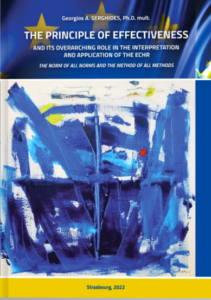

NM: You suggest that the principle of effectiveness operates in both a harmonising and a defensive manner. It serves to harmonise Convention provisions between themselves as well as with other international legal norms, and indeed to harmonise and give effect to other Convention principles, including the rule of law, democracy, equality and non-discrimination. I was particularly taken by what you identify as the defensive operation of the principle of effectiveness, notably in ‘repelling’ unduly restrictive, formalistic or arbitrary interpretations of the rights contained in the ECHR. Is the principle’s defensive operation ever undermined by other principles or concerns and, if so, what should be done about this?
GS: First let me say that based on the defensive operation of the principle of effectiveness, whenever the Court finds that there has been an unduly restrictive, formalistic or arbitrary interpretation by the domestic courts, it should find a violation of the relevant Convention provision. To be made clear, the principle of effectiveness does not permit such interpretations, but if they are nevertheless made on the basis of the principle of subsidiarity, the principle of effectiveness, by its defensive operation, sets aside such interpretations by assisting the Court to find a violation.
The principle of effectiveness creates a framework for placing within it, and, thus, under its protective umbrella, all other Convention principles in a continuous symbiotic and harmonious relationship between them. This observation justifies describing the role of the principle of effectiveness as overarching, thus being not only predominant but also all embracing.
The principle of effectiveness and the other Convention principles have a particular characteristic and common denominator: not only do they all permeate the Convention, but the principle of effectiveness in its twofold capacity, especially in its capacity as a norm of international law, is intertwined with and permeates all the other principles. Further, Convention principles are intertwined and complement each other in different ways, but no single one is subordinate to the other, if it fulfils its role properly and functions within its limits.
This can be understood in the sense that all of the Convention principles are not only indispensable tools for interpreting and applying the Convention provisions, but they are also aspects or components of the object and purpose of the Convention, aiming at making the Convention system function according to its scope as a system designed for the effective protection of human rights. One can say that these principles are the hallmarks of the Convention system. Thus, all the Convention principles must be used harmoniously between themselves to help the Convention system operate according to its scope.
The principle of effectiveness in both of its capacities harmonises all Convention principles in the same way as it harmonises Convention provisions between themselves and with other rules of international law, under the principles of internal and external harmony or coherence, which are aspects of the Principle. Principles cannot be treated differently from Convention provisions as regards their harmonisation; on the contrary, they have more need for consistency and cohesion, since their harmonisation may have an impact on the coherence of provisions.
Consequently, the Convention principles must be used and applied harmoniously between themselves under the direction or supervision of the Principle in both of its capacities, acting as a conductor, in order to serve the Convention. It can be said that the Principle animates or gives life to all Convention principles, being the driving force behind all of them. Without it, the other principles cannot be applied: their application would be dormant, and their existence merely theoretical. The relationship between the Principle and the other principles of the Convention can be said to resemble that of the right to life in relation to the other Convention rights in the sense that, without life, the protection of any other right will be nugatory.
The Principle, in its twofold capacity, cannot be considered to have fulfilled its role if the other Convention principles are not given their fullest weight and effect, and if the Principle does not synchronise and harmonise them under the umbrella of the primary object and purpose of the Convention, namely the effective protection of human rights. This is so, because the object of a Convention provision with which the Principle as a norm coincides requires synergy and cooperation with all the Convention principles which are part of it and which the Principle as a method or tool helps to achieve.
It follows that if one of the other Convention principles is applied improperly or not at all, let us say the principle of proportionality or the principle of subsidiarity, the Principle under its capacity as a norm of international law will unavoidably be violated. Likewise, should a Convention principle not be applied properly or at all, this would usually be attributed to the fact that the Principle in its twofold capacity has not been used or applied appropriately, or at all. Consequently, whenever the Principle as a norm is violated because another Convention principle, let us say the principle of subsidiarity was applied in a way that exceeded its limits and scope, unavoidably a Convention right will also be violated and the Court has no other option but to find a violation.
In particular regarding the principle of subsidiarity, it is important to note that when properly used, it does not violate the principle of effectiveness but, on the contrary, enhances it. On the one hand, the principle of effectiveness may assist the national courts in exercising their discretion reasonably, carefully, in good faith and in conformity with the State’s obligations under the Convention to protect effectively the rights secured therein. On the other hand, the principle of effectiveness assists the Court in reviewing whether the national courts have exercised their discretion according to the engagements that have been undertaken under the Convention
The Court should not decide that another Convention principle was not applied properly without being assisted by the Principle in its twofold capacity. The Principle as a norm should act as a beacon for the Court in such an exercise because it is an element of a Convention provision and the same Principle as a method will assist the Court in applying the Convention provision. I argue that the Principle as a norm of international law is a kind of limitation to the principle of subsidiarity and this is due to the fact that the principle of subsidiarity must be applied in conformity with the primary aim of the Convention. It could be said that subsidiarity is subordinate to or subsumed under effectiveness.
Though no Convention principle is subordinate to another, since all Convention principles must come under the norm of effectiveness of a Convention provision, the Principle in its capacity as norm supervises the compatibility of any other Convention principle with it, assisted by the Principle in its capacity as a method of interpretation.
It is the harmonious synthesis and application of all the Convention principles which ensure that the Convention’s aim is fulfilled.
One last point regarding this question: The capacity of the Principle as a norm of international law is not diminished or in any way altered if it is not respected in a given case. This is so, because the Principle as a norm of international law is an indispensable element of any Convention provision which secures a human right; and it is therefore also an element of the relevant human right. Human rights do not lose their validity or effectiveness because they are sometimes violated. The same applies with respect to the Principle. After all, the purpose of the Convention and the Principle, having the same raison d’être, is to effectively protect human rights from being violated or to assist in finding a violation and providing for an effective remedy in case they are violated.
NM: In the second part of your book, apart from the dual nature of the Principle you also deal with the action of the Principle from beginning to end. Can you briefly explain this?
The overarching role of the Principle and its polyvalent operation pervade all phases of the procedure of determining an alleged violation: (a) from the preliminary stage until the completion of the proceedings before the Court, and (b) in the implementation of the Court’s judgments.
Hence, the Principle should be both a point of departure and of arrival, and indeed be applied all the way through the process. To render my book’s theory more vivid in its preface, I compare the remarkable journey of the Principle as a norm in a particular case to a relay race: The Principle is inherent in the relevant Convention provision; then the provision, through its interpretation and application by the Court, passes the Principle as a baton to the judgment; and finally the judgment conveys the Principle to the mechanism for the execution of judgments under Article 46 of the Convention. The speedier this relay race, the better the Principle is upheld as a norm. Only through the effective implementation of the judgment can the Principle’s function as a norm be fulfilled.
It is submitted that, not only the survival of human rights protection, but, consequentially, also the future of the Convention system, depends upon the faithful and constant compliance with the Principle. As has been said, the Principle should follow, mould, and govern all steps of the Convention protection system. To be more precise, as my book demonstrates, the principle of effectiveness is the only Convention principle which must always follow the journey of an application from beginning to end, from the admissibility stage to the implementation stage.
NM: To close, I want to invite you, in one sentence, to tell us what you consider to be the most important message emerging from the book.
GS: As reflected in the title of my book, the principle of effectiveness has or should have an overarching role in interpreting and applying the Convention provisions and in guiding the procedure before the Court, from beginning to end, including the implementation of its judgments; so, it deserves the description I assign to it: the norm of all norms and the method of all methods, and it should therefore always be expressly referred to and applied by the Court in its never-ending task of the effective protection of human rights.
* * *
The Principle of Effectiveness and its Overarching Role in the Interpretation and Application of the ECHR: The Norm of All Norms and the Method of All Methods (Strasbourg 2022) is available for purchase here.

